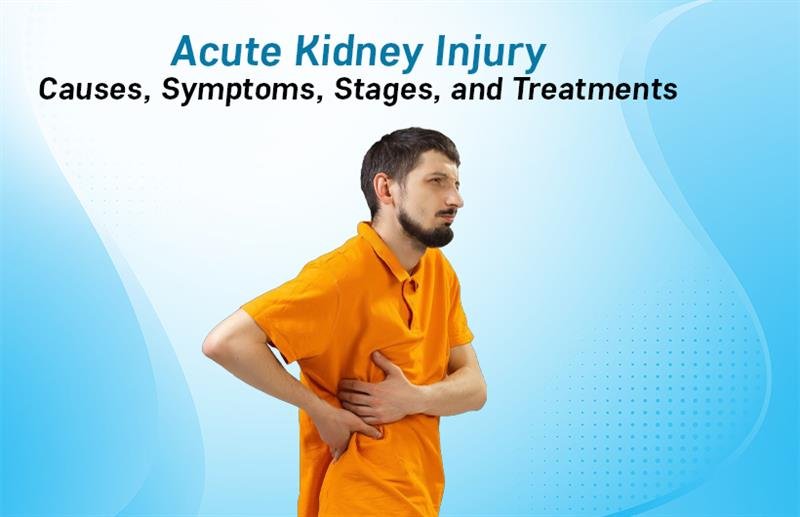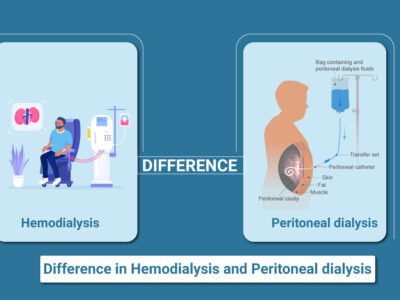Acute kidney injury (AKI), also known as acute renal failure, is a sudden loss of kidney function that occurs within hours or days. It also damages the functionality of the kidney to filter out waste products and manage electrolytes and the ratio of fluids in our body. AKI is a pathological state, and the illness has to be treated immediately, for it can aggravate and take severe form. In the subsequent part, information regarding the causes and the steps involved in making a diagnosis, the acute kidney injury symptoms and the management process are described in detail.
What Is Acute Kidney Injury?
Acute Kidney Injury is a serious decrease in kidney function which results in the accumulation of toxins in the blood and interference of electrolyte concentration. Now, chronic kidney disease develops over months and years, while AKI is an abrupt condition that may affect people of different ages. While it is often not deadly if treated, if not treated, the outcome would be the complete obliteration of the kidneys or the person’s life.
What Is the Most Common Cause of Acute Kidney Injury?
The causes of acute kidney injury can be broadly categorised into three types based on where the problem occurs:
1. Pre-Renal Causes
Pre-renal AKI occurs due to reduced blood flow to the kidneys, which may be caused by:
- Severe dehydration
- Haemorrhage as a result of a surgical operation or as an effect of a physical trauma.
- Heart failure
Low blood pressure ( hypotension)
Pre-renal AKI is most common and is usually recoverable if renal perfusion is persisted.
2. Intra-Renal Causes
This type of AKI results from direct damage to the kidney tissues, which may be caused by:
Respiratory infections like infections of glomerulonephritis or other ailments that may accrue
from respiratory complications.
- Tumours, bacterial infections or other organisms, viruses, parasites, and toxins such as some medications or contrast dyes used for imaging.
- Chronic hypoxia of the renal tissue
- Autoimmune diseases
3. Post-Renal Causes
Post-renal AKI occurs when urine flows out of the kidneys is difficult, creating an increased pressure in the kidney. Common causes include:
- Kidney stones
- Enlarged prostate
- Tumors in the urinary tract
What Are the Stages of Acute Kidney Injury?
Acute kidney injury is classified into three stages based on the severity of the condition. The stages are determined using creatinine levels in the blood and urine output.
Stage 1:
- Slight increase in creatinine levels
- Decreased urine output lasting 6–12 hours
Stage 2:
- Moderate increase in creatinine levels
- Reduced urine output lasting more than 12 hours
Stage 3:
- Significant increase in creatinine levels (threefold or more)
- Little to no urine output for more than 24 hours
The earlier AKI is diagnosed, the better the chances of successful Acute kidney injury treatments and recovery.
What Are the Symptoms of Acute Kidney Injury?
The symptoms of acute kidney injury can vary depending on the underlying cause and severity of the condition. Common acute kidney injury symptoms include:
- Decreased urine output (although sometimes urine output may remain normal)
- Swelling in the legs, ankles, or face due to fluid retention
- Fatigue and weakness
- Shortness of breath
- Confusion or difficulty concentrating
- Nausea and vomiting
- Chest pain or pressure due to fluid buildup around the heart
- High blood pressure
In severe cases, AKI may cause seizures or coma due to the accumulation of toxins in the bloodstream. It’s essential to seek immediate medical attention if you notice any of these symptoms.
What Is the Treatment of Acute Kidney Injury?
The treatment of acute kidney injury focuses on addressing the underlying cause, restoring kidney function, and preventing complications. Common acute kidney injury treatments include:
1. Managing Fluid Balance
If there is a problem with hydration, fluids are given through a vein or IV.
If there is congestion, then diuretics may be given to reduce congestion in the body.
2. Medications
The drugs may be administered to regulate blood pressure, balance the electrolytes, or to treat present infections.
Drugs that have toxic effects on the kidney should not be administered during the treatment period.
3. Addressing Underlying Causes
- Procedures to correct obstructions in the urinary system like kidney stones or tumors.
Management of infections with the right antibiotics.
4. Dialysis
In end-stage renal disease or where the kidney is no longer effective in filtering waste products or fluid then dialysis is used to filter any waste product and fluid in the blood. Dialysis is a substitute for a time-bound phase where the kidneys cannot function appropriately.
Acute kidney injury prevention
Preventing AKI involves managing risk factors and adopting a kidney-friendly lifestyle:
- You must drink a lot of water, especially during illnesses, or during physical activities.
- Contrary to this, non-prescription pain relievers, especially NSAIDs should not be used for prolonged periods because they are poisonous to kidneys.
- Support patients to self-manage long-term conditions such as Diabetes and hypertension.
- Minimising the intake of products that may have toxic effects on kidneys or which may convey certain drugs via the renal system.
Conclusion
Acute kidney injury is a severe pathology of the kidneys but if diagnosed early adequate medical management can be given. It is crucial to learn its origins, signs and signs and symptoms, and the available acute kidney injury treatments to prevent the health impacts it may have. Any sign that your body is changing such as a decrease in the amount of urine produced, leg swelling or severe tiredness should be reported to a doctor.
To speak about it with a professional or for any other kidney-related issues, you should consult Dr. Ravi Bhadania, an experienced nephrologist. About the causes of acute kidney injury, how to deal with acute kidney injury, or want to learn more about cure for acute kidney injury, Dr Bhadania will promptly and patiently address your concerns.


